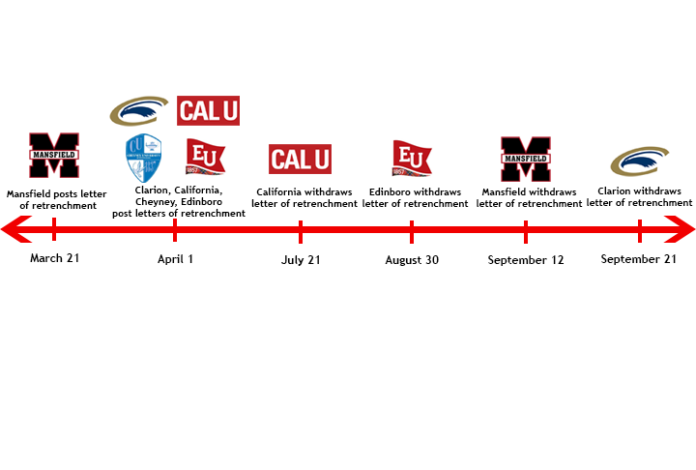Clarion University withdrew its letter of retrenchment Sept. 21, with Cheyney University the only PASSHE school with a letter remaining.
Mansfield, California and Edinboro also previously posted letters, which were withdrawn over the past year.
Ben Shaevitz, SRU APSCUF president and physics professor, said APSCUF is still meeting with members of PASSHE. These meetings include passing information between the two groups.
“Our role is to press for objective evidence that the claim (for retrenchment) is valid and accurate,” Shaevitz said. “We ask for information about budgets, finances, enrollment, programs and number of temporary faculty.”
Shaevitz described the back and forth as similar to due process, which is a right provided to the two through the faculty contract.
“Ultimately it’s not APSCUF’s decision on whether the letter will stick in the end,” Shaevitz said.
APSCUF met with PASSHE last Friday specifically about Cheyney’s situation, which posted a letter of retrenchment for financial reasons.
“It’s pretty clear from the press that there are financial issues at Cheyney so now how that will play out it’s yet to be seen,” Shaevitz said.
Shaevitz had some concern with whether or not it was reasonable to post letters which were then taken away.
“I question the utility of the process but perhaps there’s going to be something that’s going to come from it at the end,” Shaevitz said. “I’m a little troubled by the act because I think there has been damage to reputations and perhaps even enrollment because the letters came out in the early spring during the end of the recruitment season.”
If faculty did face retrenchment, APSCUF has the right to offer suggestions on how to redistribute the workforce, and those faculty members retrenched have preferential hiring rights at other PASSHE schools.
Kenn Marshall, spokesman for the state system, said that it’s not unusual for universities to post letters which are then taken away.
“The letters essentially have to go out because of the contract,” Marshall said. “If there’s any possibility at all that the university be considering retrenchment then they have to send a letter out and it’s pretty routine for several universities every year to send those letters out. It’s also almost normal practice that most of those letters are withdrawn.”
Marshall said it’s very rare for retrenchment to actually occur and Cheyney will have to notify individual faculty members by Oct. 31 if their positions will be affected.
“If they didn’t do that, even that does not mean those those positions will be retrenched,” Marshall said. “They have to make a notification, but even that does not mean that those positions will be retrenched. They can continue to meet with faculty and continue to look at ways of dealing with those positions.”
According to Marshall, Cheyney has been operating at significant deficit over the last three years, with the state system issuing several lines of credit totaling about 30 million dollars.
Marshall said that Cheyney is also under review by the Middle States Commission over the university’s accreditation.
“They’re the only university that has been relying on loans from the system to meet their operating costs,” Marshall said. “They are in significantly worse shape than any of the other universities in terms of finances.”








